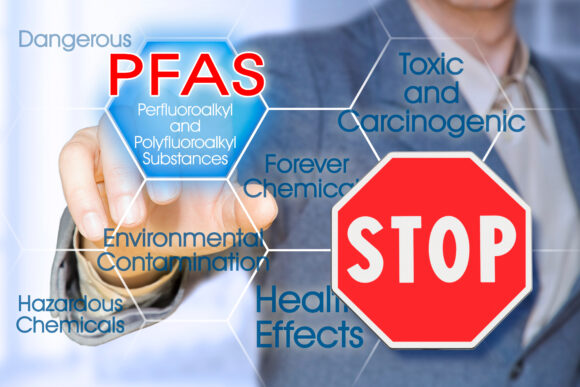
The European Commission intends to propose a ban on the use of PFAS, or “forever chemicals,” in consumer products, with exemptions for essential industrial uses, the EU’s environment chief told Reuters.
PFAS, or Perfluoroalkyl and Polyfluoroalkyl Substances, do not break down in the environment, raising concerns about the consequences of them building up in ecosystems, drinking water and the human body.
They are used in thousands of items, from cosmetics and non-stick pans to aircraft and wind turbines, due to their resistance to extreme temperatures and corrosion.
“What we know we are looking for is a ban in consumer products,” EU Environment Commissioner Jessika Roswall told Reuters in an interview.
“This is something that is important for us human beings, of course, but also for the environment, but I think also for the industry so they know how they can phase out PFAS.”
Two Years Ago
Denmark, Germany, the Netherlands, Norway and Sweden backed a broad ban on PFAS almost two years ago yet Roswall said the EU’s proposal is not likely to come together before next year at the earliest, as “essential” exemptions are determined.
Asthma inhalers and semiconductors used in green technologies such as electric vehicles are some of the potential “essential” uses, she noted, though these too will face restrictions, including on how they are disposed of.
Industrial applications such as plastics and electronics production account for most PFAS use, according to data from Nordic countries’ chemicals agencies.
Work by the European Chemicals Agency (ECHA) to assess the scope of the ban has drawn thousands of comments from, among others, trade associations representing the car, clean energy and plastics sectors, seeking exemptions such as one sought for fluoropolymers, a PFAS used in everything from waterproof clothes to solar photovoltaic cells.
Litigation Over PFAS
Research linking PFAS exposure to health issues – including liver damage, lower birth weights and testicular cancer – is raising litigation risks for companies, Jefferies analysts said in a note this month.
U.S. lawsuits have yielded settlements worth more than $11 billion involving companies including 3M and Chemours Co. over contamination of water.
Companies in Europe could face a “wave” of litigation over pollution or downplaying its environmental and health harms, said Hélène Duguy, a lawyer at environmental law firm ClientEarth.
“ClientEarth is closely monitoring companies’ conduct on PFAS and will not shy away from action,” Duguy told Reuters.
(Reporting by Kate Abnett in Brussels; additional reporting by Ludwig Burger in Frankfurt; editing by Jason Neely)
